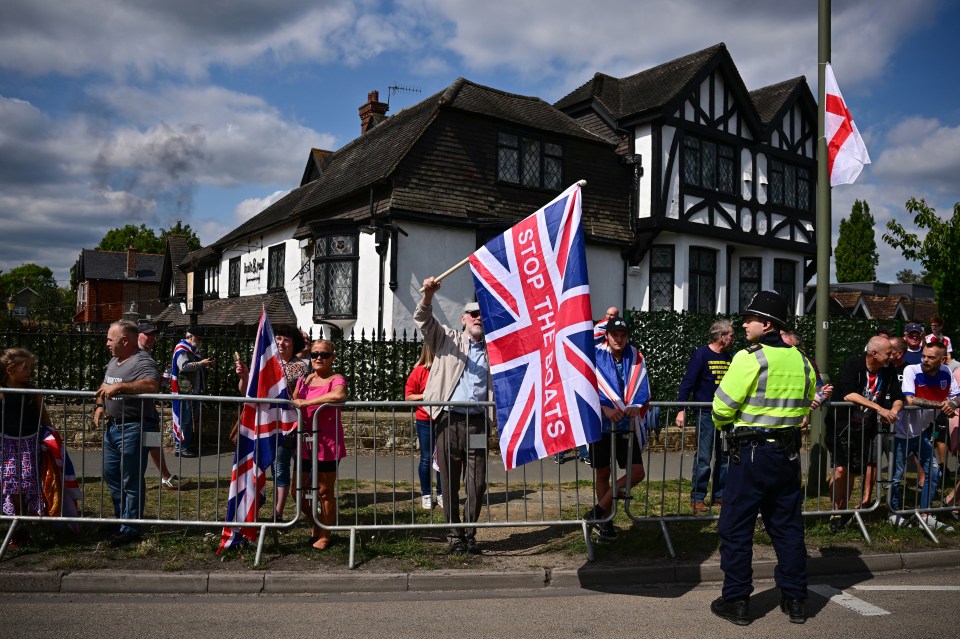KEIR Starmer is planning on overhauling the asylum appeals system in a desperate bid to move migrants out of hotels faster.
The Prime Minister wants to deport unsuccessful asylum seekers through a new fast-track system.
It comes amid growing unrest over migrant hotels, with protests cropping up all over the country.
The Times reported that the tribunal courts used by unsuccessful refugees to challenge Home Office decisions will be phased out.
Instead, they will be replaced by a fast-track system.
The plans – said to be unveiled in a few weeks – will give the new body powers to prioritise the cases of migrants in taxpayer funded housing and foreign offenders who should already have been deported.
The Home Secretary said “completely unacceptable” delays in the appeals process left failed asylum seekers in the system for years.
There are about 51,000 asylum appeals waiting to be heard, taking on average more than a year to reach a decision.
As measures have been put in place to speed up initial decisions, court delays over appeals are now thought to be the biggest cause of pressure in the asylum accommodation system.
The Government plans to set up a new independent panel focused on asylum appeals to help reduce the backlog.
The new independent body will use professionally-trained adjudicators, rather than relying on judges.
Ministers are introducing a new 24-week deadline for the first-tier tribunal to determine asylum appeals by those receiving accommodation support and appeals by foreign offenders.
But they believe the current tribunal system, which covers a wide range of different cases, is still failing to ensure failed asylum seekers can be returned as swiftly as possible, nor can it accommodate a fast-track system for safe countries.
The Government will set out further details of plans for asylum system reforms in the autumn, drawing on lessons from other European countries which have faster appeals systems – including some which run independent appeals bodies similar to the one being proposed.
The Home Secretary said the overhaul would result in a system which is “swift, fair and independent, with high standards in place”.
She said: “We inherited an asylum system in complete chaos with a soaring backlog of asylum cases and a broken appeals system with thousands of people in the system for years on end.
“That is why we are taking practical steps to fix the foundations and restore control and order to the system.
“We are determined to substantially reduce the number of people in the asylum system as part of our plan to end asylum hotels.
“Already since the election we have reduced the backlog of people waiting for initial decisions by 24% and increased failed asylum returns by 30%.
“But we cannot carry on with these completely unacceptable delays in appeals as a result of the system we have inherited which mean that failed asylum seekers stay in the system for years on end at huge cost to the taxpayer.”
Official figures released earlier this month showed a total of 111,084 people applied for asylum in the UK in the year to June 2025, the highest number for any 12-month period since current records began in 2001.
The record level of applications comes as the backlog of people waiting for an initial decision on their claims dropped to 90,812 at the end of June.
There were 32,059 asylum seekers in UK hotels by the end of June.
Labour has promised to end the use of the sites by 2029.
Protests by groups opposed to the use of hotels and counter-demonstrations took place in towns and cities across the UK on Saturday.
In Bristol, mounted police were brought in to separate rival groups in the Castle Park, and officers scuffled with protesters.
A 37-year-old woman was arrested on suspicion of assaulting an emergency worker.
Avon and Somerset Police said no officer sustained serious physical injury or has required hospital treatment, but inquiries will be carried out after reports of assaults on them.
In Liverpool there were 11 arrests for offences including being drunk and disorderly, assault and affray, as a UK Independence Party protest was met by a counter-demonstration.
In Horley, Surrey, about 200 anti-immigration protesters draped in St George and Union flags clashed with roughly 50 Stand Up to Racism protesters.
The two groups almost came together in the early afternoon, with lines of police separating them.
Three people were arrested, two for breach of the peace and one for breaching the conditions of a community protection notice, Surrey Police said.
On Tuesday, the High Court granted Epping Forest District Council a temporary injunction to remove asylum seekers from the Bell Hotel in Epping, Essex, from September 12.
Regular protests had been held outside the hotel in recent weeks after an asylum seeker was charged with trying to kiss a 14-year-old girl, which he denies.
The Government announced plans on Friday to appeal against the High Court’s refusal to allow it to intervene in the case, and to further appeal against the temporary injunction.
Other councils also publicly announced their intention to seek legal advice as to whether they could achieve a similar injunction for hotels in their areas.














